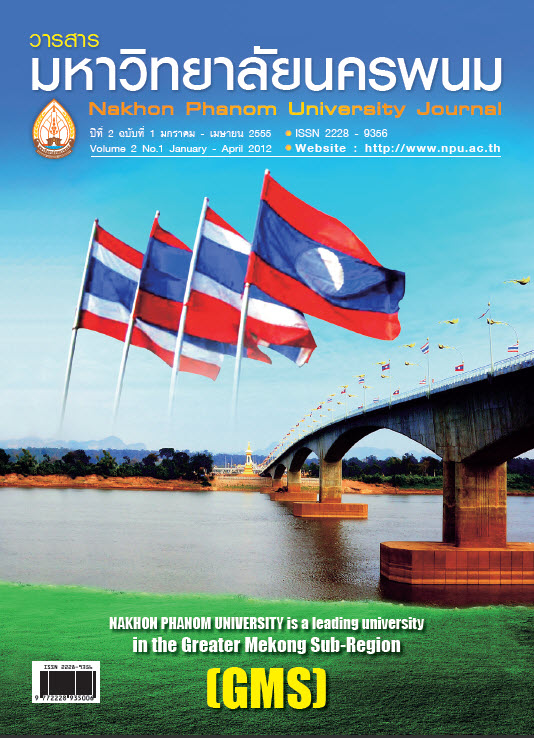การเปรียบเทียบการคิดวิเคราะห์ ผลสัมฤทธิ์ทางการเรียนและเจตคติเชิงวิทยาศาสตร์กลุ่มสาระการเรียนรู้วิทยาศาสตร์ เรื่องสารและการเปลี่ยนแปลงของนักเรียนแบบผสมผสาน กับวิธีการสอนแบบปกติ
Main Article Content
Abstract
การวิจัยครั้งนี้มีจุดประสงค์เพื่อเปรียบเทียบการคิดวิเคราะห์ ผลสัมฤทธิ์ทางการเรียนและเจตคติเชิงวิทยาศาสตร์ กลุ่มสาระการเรียนรู้ วิทยาศาสตร์ เรื่องสารและการเปลี่ยนแปลงของนักเรียนชั้นมัธยมศึกษาปีที่ 2 ระหว่างกลุ่มที่เรียนโดยวิธีการสอนแบบผสมผสานกับวิธีการสอนแบบปกติ กลุ่มตัวอย่างที่ใช้วิจัย คือ นักเรียนชั้นมัธยมศึกษาปีที่ 2 จำนวน 46 คน จากโรงเรียนเมืองน้อยวิทยาคม อำเภอธวัชบุรี จังหวัดร้อยเอ็ด ซึ่งได้มาโดยการสุ่มแบบกลุ่ม (Cluster Random Sampling) โดยแบ่งนักเรียนเป็น 2 กลุ่มได้แก่ กลุ่มทดลองซึ่งเรียนแบบผสมผสาน จำนวน 23 คน และกลุ่มควบคุมซึ่งเรียนแบบปกติ จำนวน 23 คน เครื่องมือที่ใช้ในการวิจัยประกอบด้วยแผนการจัดการเรียนรู้แบบผสมผสาน และแผนการจัดการเรียนรู้แบบปกติ จำนวนอย่างละ 9 แผน แบบทดสอบวัดผลสัมฤทธิ์ทางการเรียนวิทยาศาสตร์ จำนวน 40 ข้อ ซึ่งมีค่าความยากตั้งแต่ 0.37 ถึง 0.80 ค่าอำนาจจำแนกรายข้อตั้งแต่ 0.21 ถึง 0.73และค่าความเชื่อมั่นทั้งฉบับเท่ากับ 0.96 แบบทดสอบวัดการคิดวิเคราะห์ จำนวน 30 ข้อ ซึ่งมีค่าความยากตั้งแต่ 0.50 ถึง 0.80ค่าอำนาจจำแนกรายข้อตั้งแต่ 0.27 ถึง 0.53 และค่าความเชื่อมั่นทั้งฉบับเท่ากับ 0.82 และแบบวัดเจตคติเชิงวิทยาศาสตร์ จำนวน 20 ข้อมีค่าอำนาจจำแนกตั้งแต่ 3.37 ถึง 20.73 และมีค่าความเชื่อมั่นทั้งฉบับ 0.91 สถิติที่ใช้ในการวิเคราะห์ข้อมูล ได้แก่ ค่าเฉลี่ยส่วนเบี่ยงเบนมาตรฐาน และการทดสอบสมมติฐานใช้ F-test (One-Way MANOVA)ผลการวิจัยปรากฏว่า นักเรียนชั้นมัธยมศึกษาปีที่ 2 ที่เรียนรู้แบบผสมผสานมีความสามารถในการคิดวิเคราะห์ ผลสัมฤทธิ์ทางการเรียนกลุ่มสาระการเรียนรู้วิทยาศาสตร์ เรื่องสารและการเปลี่ยนแปลงและเจตคติเชิงวิทยาศาสตร์ สูงกว่านักเรียนที่เรียนรู้แบบปกติอย่างมีนัยสำคัญทางสถิติที่ระดับ .05
The purpose of this study was to compare the analytical thinking, learning achievement, and scientific attitude in the science learning group on substances and changes issue. The samples were 46 grade eight students at Muangnoiwitthayacom School, Thawatburi district, Roi-Et. They were obtained by using the Cluster Random Sampling technique and classified into 2 groups: 23 students in the experimental group studying the mixed instructional activities approach and other 23 students in the control group studying the conventional teaching approach. There were four research instruments used in this study: 1) 9 lesson plans of mixed instructional activities approach, 2) 9 lesson plans of conventional learning approach, 3) 40-item science achievement test with difficulty ranging between 0.37 - 0.80, a discrimination value at 0.21 - 0.73 and a reliability of 0.96, 4) 30-item analytical thinking test with difficulty ranging between 0.50 - 0.80, a discrimination value at 0.27 - 0.53 and a reliability of 0.82, and 5) 20-item scientific attitude test with a discrimination value at 3.37 - 20.73 and a reliability of 0.91. The statistics used for analyzing data were mean, standard deviation and F-test (One-way MANOVA). The results demonstrated that the grade eight students who have been taught the mixed instructional activities approach showed higher competence of analytical thinking, learning achievement and scientific attitude than those of learning the conventional learning approach at the significance level of .05.


